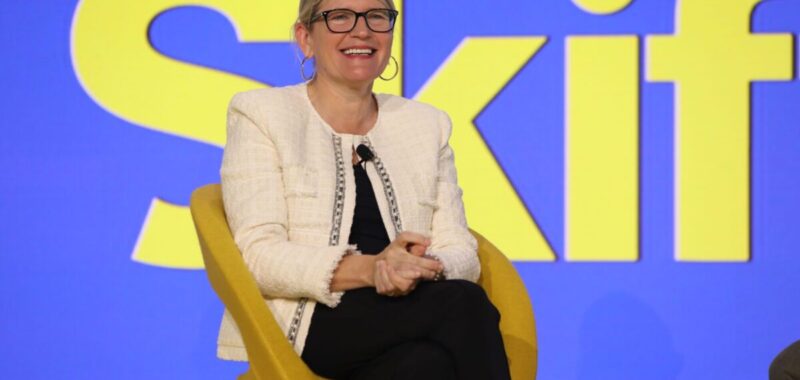Skift Take
JetBlue CEO Joanna Geraghty said at the Skift Global Forum that JetBlue is focused on its âcore strategyâ as it seeks to become consistently profitable.
Nearly nine months into the job, JetBlue CEO Joanna Geraghty has dealt with an activist investor, Pratt and Whitney engine issues and the fallout of JetBlueâs failed merger with Spirit Airlines.
âAt the end of the day, I feel that I’m sort of in this role to shepard JetBlue through a challenging period where weâre coming out of,â she said at the Skift Global Forum on Thursday.
JetBlue is posting profits for the first time in a while, it culled unprofitable routes and it deferred aircraft deliveries in a bid to boost its balance sheet.
âOur focus is really around how do we bring humanity back to all parts of the customer experience,â Geraghty said.
Mergers Are Off the Table, for Now
After a federal judge blocked JetBlueâs merger with Spirit, JetBlue had to forge a new path as a standalone carrier.
And Geraghty doesnât see any mergers in the near future.
âIt’s difficult to see how the merger can happen with this administration,â Geraghty said. âAnd so for JetBlue, we’re focused on executing our core strategy.â
U.S. regulators approved a merger between Alaska Airlines and Hawaiian Airlines on Tuesday, but only after securing several consumer protections. On the other hand, the Justice Department successfully sued to block the JetBlue-Spirit merger on the grounds that it could raise airfares.
Before Geraghty stepped into the top spot, JetBlue had been looking for other ways to grow. The airline started launching several routes into Europe and developed a partnership with American Airlines called the Northeast Alliance. That partnership was also struck down in federal court.
When asked if JetBlue would ever consider joining one of three airline alliances â SkyTeam, Star Alliance or Oneworld â Geraghty said it was something JetBlue would consider.
âWe’ve got over 50 airline partners that provide relevance around the world, but we do recognize that as a 5% player in the United States, sometimes our limited network relevance can be challenging for customers who want to buy everywhere, so it’s something we’ll continue to evaluate,â Geraghty said.
JetBlue Bets on Premium
JetBlue announced Thursday morning that it would open its first-ever lounges at its hubs in New York and Boston in a push to attract more premium travelers.
Geraghty said JetBlue hadnât offered lounges before because it wanted to ensure it could keep fares low.
âIt costs a lot of money to operate a lounge. You’re in it for a short period of time, and when you look at what some of the other airlines had created in their lounges, it was a less than stellar experience,â she said.
Geraghty added that JetBlue would aim to offer a more âbespokeâ experience with its lounges.
âIt’s going to be somewhat limited in who can access it,â Geraghty said. âBut at the end of the day, you know, our loyalty program will be broadly accessible for a pretty vast segment of folks who travel to JetBlue pretty frequently, at a level that’s much lower than some of the legacy carriers.â
The move to open lounges in New York and Boston is a bold one for JetBlue. Airport lounges have become an increasingly competitive space as legacy airlines and credit card companies like American Express, Chase and Capital One have been racing to chase more customers.
Delta has a particularly big presence in both markets and is slated to open its ultra-premium Delta One lounge in Boston Logan International Airport this fall.
But Geraghty maintained that JetBlue would still be a low-cost airline. âIt’s just low-cost with a premier segment,â Geraghty said.
Engine Issues Continue to Strain JetBlue
Due to issues with Pratt & Whitney geared turbofan engines, JetBlue is expecting to ground several of its aircraft this year â and itâs possible that number could grow in 2025 and 2026.
The carrier is currently in the process of reaching a compensation agreement with Pratt & Whitney. To cope with the groundings, JetBlue deferred $3 billion in aircraft spending until 2029 and the delivery of 44 Airbus A321neos until at least 2030.
Geraghty said the groundings have been frustrating for JetBlue.
âYou’re spending a lot of money for a brand new plane with a beautiful customer experience, and then after about a year-and-a-half, we have to ground it,â Geraghty said.

